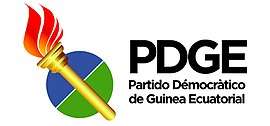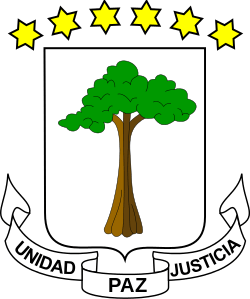Democratic Party of Equatorial Guinea
Democratic Party of Equatorial Guinea Partido Democrático de Guinea Ecuatorial | |
|---|---|
 | |
| Leader | Teodoro Obiang Nguema Mbasogo |
| Founded | 11 October 1987 |
| Headquarters | Malabo, Equatorial Guinea |
| Ideology |
African nationalism Authoritarianism Militarism |
| Chamber of Deputies |
99 / 100 |
| Website | |
|
www | |
 |
|---|
| This article is part of a series on the politics and government of Equatorial Guinea |
| Administrative divisions (provinces) |
|
The Democratic Party of Equatorial Guinea (Spanish: Partido Democrático de Guinea Ecuatorial, abbreviated PDGE) is the ruling political party in Equatorial Guinea. It was established by President Teodoro Obiang Nguema Mbasogo as the country's sole legal political organization on 11 October 1987. The current Secretary-General is Gerónimo Ossa Ecoró.
Despite the legalization of opposition parties in 1991, the PDGE has been the dominant party since its inception. In the 2004 parliamentary election, 98 of 100 seats were won by either PDGE members or "opposition" parties that support Obiang; in the 2008 parliamentary election, the PDGE and its allies won a total of 99 out of 100 seats.[1] In presidential elections, Obiang typically wins 95-99% of the vote, with the opposition regularly calling for boycotts.
The party has an extremely narrow base, which is the Esangui clan of the Fang tribe, located in the Mongomo region of Río Muni. Since independence in 1968, Equatorial Guinea has been ruled by a single family; the first president, Francisco Macías Nguema, was overthrown by his nephew, Obiang, in the 1979 coup d'état. The party has been criticized for acting in a very authoritarian manner and teaming up with the government to inform on political dissidents. The party is considered by the vast majority of international observers to be corrupt.
Stances
The PDGE has little in the way of a platform or guiding ideology other than support for Obiang. One of its few concrete policy stances is support of foreign investment in the oil sector. Some of the few other tenets of the PDGE are militarism and anti-separatism (which often amounts to Fang chauvinism).
The community leaders in all of rural Equatorial Guinea are strongly pressured to be members of the party, and also pressure citizens throughout their communities into joining.
Although almost all the highest placed political appointments are held by former soldiers, the core military force -the army- remains somewhat underfunded in favour of naval and air-force maintenance. Government expenditures are equal to less than 10% of GDP, with military expenditures accounting for roughly 25-35% of that figure. The amount of the budget spent on schooling, healthcare and other such investments is in proximity to the military budget. The constitution guarantees that the government will have a monopoly in certain industries, although much has been done to privatise these industries, in similar fashion to the way oil drilling was privatised. The party also has a minister for women, and has in recent years pursued a female empowerment agenda.
Electoral History
Presidential Elections
| Election date | Party candidate | Number of votes received | Percentage of votes |
|---|---|---|---|
| 1989 | Teodoro Obiang Nguema Mbasogo | Not released | 99% |
| 1996 | Teodoro Obiang Nguema Mbasogo | 179,592 | 97.8% |
| 2002 | Teodoro Obiang Nguema Mbasogo | 204,367 | 97.1% |
| 2009 | Teodoro Obiang Nguema Mbasogo | 260,462 | 95.36% |
| 2016 | Teodoro Obiang Nguema Mbasogo | 271,177 | 92.70% |
| Election | Leader | Number of votes received | Number of seats | |
|---|---|---|---|---|
| # | % | |||
| 1988 | Teodoro Obiang Nguema Mbasogo | Not released | 99.2% | 60 / 60 |
| 1993 | Teodoro Obiang Nguema Mbasogo | 54,589 | 69.8% | 68 / 80 |
| 1999 | Teodoro Obiang Nguema Mbasogo | 156,949 | 85.5% | 75 / 80 |
| 2004 | Teodoro Obiang Nguema Mbasogo | 99,892 | 49.4% | 68 / 100 |
| 2008 | Teodoro Obiang Nguema Mbasogo | Not released | Not released | 99 / 100 |
| 2013 | Teodoro Obiang Nguema Mbasogo | Not released | Not released | 99 / 100 |
| 2017 | Teodoro Obiang Nguema Mbasogo | Not released | 92.00% | 99 / 100 |
| Election | Leader | Number of votes received | Number of seats | |
|---|---|---|---|---|
| # | % | |||
| 2013 | Teodoro Obiang Nguema Mbasogo | Not released | Not released | 54 / 70 |
| 2017 | Teodoro Obiang Nguema Mbasogo | Not released | 92.00% | 55 / 70 |
Notes
15 members are appointed by the President
References
- ↑ "Guinée équatoriale: le parti présidentiel grand vainqueur des législatives" Archived May 20, 2011, at the Wayback Machine., AFP, May 9, 2008 (in French).
External links
- Democratic Party of Equatorial Guinea (Spanish)